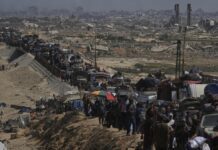
Defense Secretary Pete Hegseth and Joint Chiefs Chairman Gen. Dan Caine depart at the end of a news conference at the Pentagon in Washington, Sunday, June 22, after the U.S. military struck three sites in Iran, directly joining Israel’s effort to destroy the country’s nuclear program. Alex Brandon/AP hide caption
toggle caption
Alex Brandon/AP
President Trump’s decision to strike three nuclear sites over the weekend in Iran is a gamble with “no endgame in mind,” according to Sen. Mark Kelly, D-Ariz.
Defense Secretary Pete Hegseth said after the strikes that Iran’s ambitions to build nuclear weapons had been “obliterated.” But experts analyzing satellite imagery of the struck areas say that’s unlikely because Iran may have moved large amounts of its enriched uranium.
In an interview with Morning Edition, Kelly, who serves on the Senate Intelligence and Armed Services Committees, and flew missions as a naval aviator in the Gulf War, said he worries the strikes leave the U.S. in a “dangerous” moment.

Middle East crisis — explained
4 takeaways on the U.S. airstrikes on Iran — and what might come next
“The Iranians at any moment now could attack Americans. That wasn’t a risk we had before this strike was conducted,” Kelly said. “And my biggest worry here is – even though we tried to set them back in developing a nuclear weapon – this could be the moment that they make a decision to start building a bomb and further enriching that uranium.”
During his conversation with NPR’s Michel Martin, Kelly also discussed the president’s decision to not inform some key Democratic leaders in Congress of the strikes.
This interview has been lightly edited for length and clarity.
Interview highlights
Michel Martin: Over the weekend, you noted that Iran is enriching uranium more than what they would need for power generation. They were doing something that the U.S. and other allies don’t want them to do. But you also said that there was no clear present, immediate danger to the U.S. and to our troops and even to Israel with regards to nuclear capability. You said that this did not have to be done this way. But if it was effective in halting or slowing down Iran’s nuclear capability, what’s wrong with it?
Sen. Mark Kelly: Well, it also might speed up their race to get a nuclear weapon. They were not actually building a weapon. Our big concern was the amount of enriched uranium that they had, which, as you noted, was much more than what they needed for a civilian nuclear power.This was a big gamble. We don’t know what the endgame is here. [The Trump administration] didn’t get authorization from Congress, as they should. And previous presidents chose not to do this because of the risk of getting into a wider regional war. So in my view, this was a mistake. It did not have to be done. Now it puts our troops at risk. And as I mentioned that you saw there was no imminent threat to the United States.

Sen. Mark Kelly, D-Ariz., questions John Ratcliffe, President-elect Donald Trump’s choice to be the Director of the Central Intelligence Agency, appearing before the Senate Intelligence Committee for his confirmation hearing, at the Capitol in Washington, Wednesday, Jan. 15, 2025. (AP Photo/John McDonnell) John McDonnell/AP hide caption
toggle caption
John McDonnell/AP
Martin: It’s customary and some might argue it’s required for the president to at least consult the so-called Gang of Eight. That’s the leaders of the House and Senate from both parties. It’s the ranking members of the Intelligence Committee, from both parties on both the House and Senate side. The reporting suggests that that did not happen. A few key Republicans were notified, but no Democrats were. If that is true, what’s the recourse that the Democratic leaders have here?
Kelly: This administration operates outside of any norms frequently. So I’m not surprised that this is the way that they conducted themselves. There’s probably not a lot we can do, but we can continue to push this administration on an authorization of use of military force to tell us what is now the current goal here? What is the plan that they have going forward? How are we going to protect our troops in the region? What’s the regional posture going to be? The Iranians at any moment now could attack Americans. That wasn’t a risk we had before this strike was conducted. And my biggest worry here is – even though we tried to set them back in developing a nuclear weapon – this could be the moment that they make a decision to start building a bomb and further enriching that uranium.

National Security
Satellites show damage to Iran’s nuclear program, but experts say it’s not destroyed
Martin: If the Democrats have no recourse here, what incentive does the administration have to consult with them in the future?
Kelly: Well, they should comply with the Constitution. And traditionally, presidents have done that. I know recently, sometimes with certain actions, when it is viewed as protecting the safety of our country, presidents can act and then they should be able to notify us. Listen to what J.D. Vance said the other day: He said we’re not at war with Iran, we are at war with Iran’s nuclear program. It’s the same thing.
Martin: Let me ask you about this. J.D. Vance, Marco Rubio, Pete Hegseth all said yesterday that the administration did not want regime change in Iran. But then President Trump posted on social media that if the current regime is unable to make Iran great again, why wouldn’t there be regime change? How do you understand that?
Kelly: Well, I understand it as the president is open to regime change. Now, whether he will try to push Iran in that direction is another question. I’m sure the Israelis would like to see that. This is a dangerous moment with no end game in mind.
This web story was edited by Treye Green. The radio version was produced by Vince Pearson and Nia Dumas.












